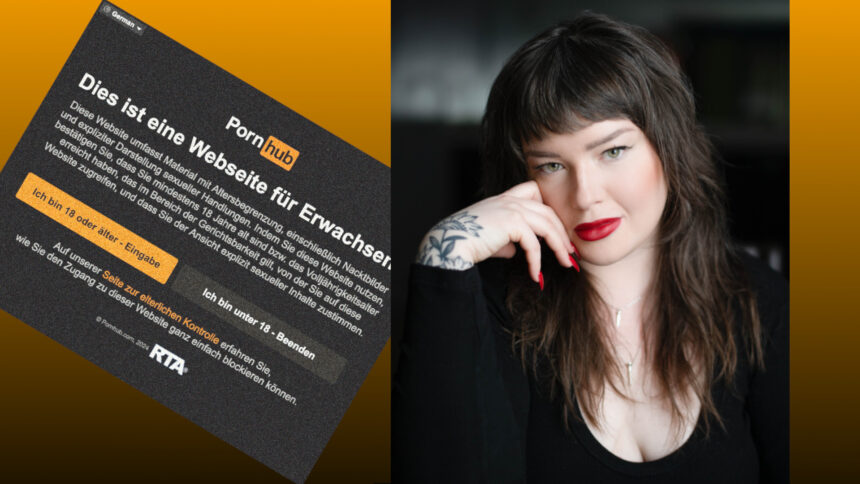For a while, it seemed as though the crises for Pornhub would never end. The porn platform, which is part of the Aylo Group, is one of the largest of its kind – and one of the most visited websites in the world. Since 2020 at the latest, Pornhub has faced international criticism due to the presence of videos on the platform depicting sexualized violence, some of which involved minors.
This sparked a broad wave of outrage: an anti-Pornhub petition gathered over two million signatures; politicians drafted stricter laws; the platform removed millions of videos from unverified uploaders, law firms filed lawsuits against the company, and payment providers like Visa and Mastercard withdrew their services from Pornhub.
Since 2023, Pornhub has been attempting to turn the tide by taking a proactive approach. A Netflix documentary painted a nuanced and even favorable picture of the platform. The reclusive Austrian investor Bernd Bergmair was replaced by a new owner: Ethical Capital Partners, which came with new promises of transparency. Gradually, Pornhub tightened its policies, now requiring that all visible performers in any recording provide identification and consent forms.
Nevertheless, the company remained tight-lipped on critical matters. Press inquiries not only from Germany have largely gone unanswered. All the more surprising, then, that in November, Pornhub offered netzpolitik.org a personal interview for the first time. During the Venus erotic fair, Alex Kekesi, Pornhub’s head of community and brand management, traveled to Berlin. Here she discusses the transformations within the company, Pornhub’s lobbying efforts against regulatory policies, and what she believes the media often gets wrong.
Age verification at site level: „Real dangers“
netzpolitik.org: Alex Kekesi, how important is Germany for Pornhub?
Alex Kekesi: Very important. We have a lot of German fans. We have a lot of German content creators as well. In terms of visitor numbers, Germany ranks sixth in the world in 2023.
netzpolitik.org: Which digital policy issue is Pornhub currently most concerned about with regard to the EU?
Alex Kekesi: This is the question of age verification. What we’re consistently seeing is that these laws are designed primarily for asking for verification at the site level. We don’t agree that that’s the best way to do it. We do think that age verification can be a really good thing, when it’s done right, because our products are not intended for children. But we think it should be done in a way that’s more effective.
netzpolitik.org: What’s your criticism of age verification at site level?
Alex Kekesi: I think that there are real dangers. It’s not only a threat to the industry but a big threat to adult online communities in general. How many adult websites exist in the world? I think it’s probably hundreds of thousands, if not millions. So how is any government equipped to go after it? It’s impossible to enforce age verifications with every single one. So the site level approach is putting targets on the largest websites. They are going to be blocked or be less accessible because of age verification. This drives the audience to smaller websites that don’t even verify their content and will not comply with any age verifications.
netzpolitik.org: How would you approach the matter instead?
Alex Kekesi: Basically the idea would be, when you’re setting up the operating system of your phone or any other device, you would do age verification at that stage only. Without verification, the operating system would be set up in a way that everything not suitable for children is blocked. So instead of having to do it every single time that you’re getting to a website or a platform your device would just know that you’re of age and it just unlock it seamlessly.
„There’s been calls to jail all pornographers“
netzpolitik.org: There are serious concerns about this approach as well – we wrote some articles about the dangers of age verification. Age verification at the site level is currently spreading not only in the EU, but also in the US. To what extent does a re-elected US president Donald Trump pose a threat to Pornhub?
Alex Kekesi: I think Donald Trump personally avoids addressing those questions. Age verification is happening at the state level and it is not being discussed federally in the US. But when it comes to Project 2025 …
netztpolitik.org: … the infamous master plan by Trump-fanatics to reshape the political system of the US …
Alex Kekesi: … there’s been calls to jail all pornographers and to outlaw pornography specifically. Is that scary to us? Absolutely. But that’s why we’re making these efforts to be more vocal. Age verification laws in the US are very much tied into that. The Intercept has reported about one of the architects of Project 2025. It was a hidden camera report where he said that age verification laws are actually a backdoor to ban porn.
„We’re contesting our designation as VLOP“
netzpolitik.org: The European Commission designated some adult platforms as so-called VLOPs, very large online platforms. Pornhub is one of them, which means it has much stricter obligations to fulfill. Do you think these obligations for Pornhub are fair and sensible?
Alex Kekesi: As I’m sure you’re aware, we’re contesting our designation as VLOP, so I’ll leave it at that.
netzpolitik.org: Pornhub claims to have less than 45 million monthly active EU users, which is the threshold for the designation as a VLOP. For me, it just doesn’t seem to add up. Pornhub is one of the most visited sites both worldwide and in the EU. Can you please explain how it can be possible that such a popular site has less than 45 million users in the EU?
Alex Kekesi: We’re not trying to be mysterious or opaque about it. Based on projections we know that at some point we will grow and get categorized justifiably as a VLOP, and at that time we’re more than happy to comply.
netzpolitik.org: According to your projections, in how many years will Pornhub cross the threshold to a VLOP?
Alex Kekesi: We are not going to project the timeline.
netzpolitik.org: I’ve analyzed your first DSA transparency report. And there was one thing that bothered me: The majority of deleted content on Pornhub was classified as TOS violations. But the report did not specify the kind of violation. In this way, it remains unclear how large problems such as image-based sexual abuse actually are on the platform. Why is your transparency report not more precise?
Alex Kekesi: The DSA requires filing under set categories, which are not terribly specific. If you want a more specific breakdown of content removed, you are welcome to review our regular transparency report, which goes into more detail.
Pornhub’s regular transparency report for the first half of 2024 also categorizes the majority of content removals as „Community Guidelines violations“. Pornhub does not provide more precise percentages here, but gives examples for these kinds of violations: retracted consent to appear on the site; „violations related to brand safety, defamation, and the use of our platform for sexual services“.
Pornhub’s source of income: „100 percent ads“
netzpolitik.org: What is Pornhub’s and Aylo’s main financial source of income?
Alex Kekesi: For Pornhub it’s 100 percent ads. The parent company Aylo also has paid sites that are subscription based. So ads and paid sites are Aylo’s main sources of revenue. A smaller one is our adult gaming platform Nutaku.
netzpolitik.org: How much profit and revenue does Aylo make exactly?
Alex Kekesi: As a privately held business we’re not able to answer that.
netzpolitik.org: I suppose it’s not so much that you can’t as that you don’t want to?
Alex Kekesi: We don’t.
netzpolitik.org: Why?
Alex Kekesi: We’re a private company. Most private companies don’t divulge their earnings.
netzpolitik.org: At least in the past six years it has been quite hard for journalists to get in contact with people from Pornhub. At least some of my emails were answered by some „Ian“ from a gmail-address, although I initially wrote to an official company address. Why?
Alex Kekesi: Yeah, Ian uses both addresses. It’s just because his Pornhub emails were getting sent to people’s spam. It’s the same with me. I was using an address „@pornhub.com“ but don’t use it anymore, because it never reaches people.
netzpolitik.org: After some years of writing emails to the alleged spokesperson of another porn site, xHamster, I’ve learned: That person didn’t exist. It was rather an alias for the whole team. Is Ian a real person?
Alex Kekesi: Yes, Ian exists! He’s a real person.
netzpolitik.org: I’m glad to hear that. But he’s protecting his full name, right?
Alex Kekesi: Yes. There’s been many doxing attempts, with people from the industry in general and with him specifically. That’s the reason why people associated with the industry often protect their names.
„We’re able to be a lot more transparent“
netzpolitik.org: Got it. I’ve asked Ian multiple times about interviewing some Pornhub officials, but it didn’t work for years. Now you’ve asked me. What has changed?
Alex Kekesi: Many things have changed since the company is run by ECP …
netzpolitik.org: … Ethical Capital Partners that bought Pornhub’s parent company and changed the name from Mindgeek to Aylo in 2023.
Alex Kekesi: If you’re not taking the advantage to reply to questions, others are going to fill that space for you. Unfortunately, in some cases, that leads to a lot of mischaracterization, both of our company but also of the industry in general.
netzpolitik.org: What was the media getting wrong about Pornhub?
Alex Kekesi: A lot. I think one of the things that’s very positive since the acquisition by ECP is that we’re able to be a lot more transparent. I’ve been with the company for eleven years. I’ve seen a very big evolution in not only Pornhub as a brand and as a platform, but just the adult industry in general. And one of the things that I think is really fantastic about Pornhub specifically is the way that we’ve evolved our trust and safety protocol. It’s changed a lot over the past ten years. I really think Pornhub is a very safe platform that creators can use right now to not only monetize their content but also users to have confidence that the content that they’re looking at is consensual.
netzpolitik.org: Pornhub has deleted millions of unverified videos in 2020 and later enhanced the verification routine to check every person visible in an upload. These changes have been profound, I think.
Alex Kekesi: I agree.
netzpolitik.org: Regarding your eleven years in the company, what do you regret most about Pornhub’s past policy decisions?
Alex Kekesi: I don’t know that I can really speak to that. If you’re talking about the Pornhub of like five years ago, I was a pretty junior employee. It’s not that I want to kind of shirk responsibility. We’re doing the right thing today and we’re going to continue doing the right thing.
„There’s so much stigma about the industry“
netzpolitik.org: Especially in the USA the religiously based anti-porn movement is very strong. NGOs like „Exodus Cry“ or NCOSE campaign heavily against porn and sex work in general, often referring to victims of sexual violence and non-consensual uploads. Would Pornhub’s recent transformation have happened without these activists?
Alex Kekesi: I never want to give an extremist group credit for us doing the right thing. I really do think their main goal is to destroy the porn industry because it goes against their own religious personal beliefs. I think that one of the most dangerous things that these groups in particular are pushing is conflating sex trafficking and legal consensual sex work. There’s so much stigma about the industry that many people think: Yeah, no one would ever willingly do that. I think that removes a lot of agency from the person that very willingly does this work.
There is also a double standard here. You would never ask someone that’s working at a cafe for minimum wage: Is your work exploitative, is this your dream job? Maybe you’re just doing porn or any other work to pay your bills.
netzpolitik.org: News media often portray Pornhub as the only major porn site, but with xHamster and XVideos there are at least two other major sites worth looking at critically. Is Pornhub the scapegoat of the whole industry?
Alex Kekesi: I think in some ways, yes. But I think my frustration would be more that a lot of these issues like content moderation are not unique to porn. They concern all user generated content platforms. However, porn sites are often treated differently. But I think that we’re definitely also capitalizing on the fact that we are so much under scrutiny to lead by example. And I hope that this results in more changes across the industry as well.





Hi, the link ‚minor‘ is referring to an article about UK being pressured by evangelical-owned US companies. That’s a prime example of Christians harrassing anyone not compliant with their attempt to impose their weird sexual morals on everyone. But as to my understanding, the just applied their usual and quite uninspired ‚who is thinking of the children‘ cries. Were there actual minors involved, outside of some Christian sickos imagination?
the probably most reported case is serena fleites. alex explains quite well how anti-porn-activists use real victims for their campaigns.
Congratulations on getting an interview with Alex! A great example of journalists providing real, first-hand information, rather than opionions and hear-say!
On the issue of age verification, though, an even better approach might be to turn the discussion upside down, and ask why we need to make the whole world child safe. We don’t, and we can’t do that in the real world. Instead, we provide safe places for children, where they can roam around, and ask the parents to make sure they don’t run on motorways, rails and other unsafe places. The same could apply to the internet. Why not white-list safe places, and set up children’s phones and computers so kids stay away from places that are not certified safe?
I love how in their transperancy report thei condem animated imagery of supposed people below the age of 18.
Meanwhile they have verified accounts posting content of woman dressed in school uniforms and/or petite individuals in childish clothing.
Hipocrisy at its best.
In the middle of the article Alex clearly say:
“How many adult websites exist in the world? I think it’s probably hundreds of thousands, if not millions.”
And you finish the article with:
“News media often portray Pornhub as the only major porn site, but with xHamster and XVideos there are at least two other major sites worth looking at critically.”
I can’t see any logic here, it’s worth looking at critically at the whole adult industry, without exceptions, if you wish to reach some real goal.